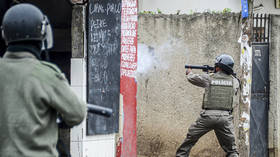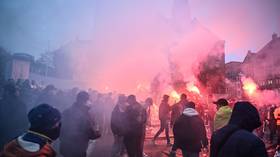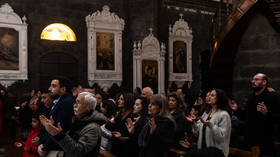On the Great Patriotic War, historical truth, and our memory
In his latest video blog, President Dmitry Medvedev addresses the nation prior to remembering WWII on Victory Day.
In the life of every one of us, there are holidays and memorable dates that have very special meaning. There are also cases when the line between personal and common interest is blurred – when personal matters become a wider concern and when community issues feel close and personal. The ninth of May, the Victory Day, is an example of just such a holiday. It is our common holiday, a day for every one of us, and a day for every Russian family. Naturally, everyone has his or her own attitude towards this holiday, mostly because of our close relatives, grandfathers and great grandfathers who fought and passed through the furnace of war.
My grandfathers (Afanasy Fedorovich Medvedev among them) fought there, too. He fought at Malaya Zemlya, and every time he remembered this, tears would appear in his eyes, because he had very special feelings about it every time. It was a very dramatic period in his life. My other grandfather, Veniamin Sergeyevich Shaposhnikov, was in that war, too. Fortunately, they both happened to come back from the war. I remember from my childhood that I used to talk to both of them about the Great Patriotic War. As a child, I was extremely interested in the details, which were sometimes very harsh, sometimes routine, but would characterize the time of war. In that sense, they were a priceless source of information for me, and of course, every one of us has people who can be such a source of information.
I remember when I first came to the Museum of the Leningrad Blockade in my childhood years. I was shocked at the avalanche of grief brought by the blockade and amazed at the colossal, unequalled courage of the people of our city. That moment will never fade from my memory, and neither will some very sad exhibition displays in that museum.
This January, I talked to Daniil Granin, when I was handing him the highest state award. He was talking about the objective laws of that tragic time. He said that the first to be saved were people who did their best to save others, without thinking of their own lives or health. This is great, yet simple, wisdom.
Every year, the celebration of Victory Day gains new shades. Sadly, they are not always festive. More often, we have encountered what is now called historic falsifications, and many of you might notice that those attempts are becoming harsher and more aggressive. While time, which goes on and on, should take us farther and farther from that war, the number of interpretations of that time – and very disputable ones at that – are not getting smaller. Why is this happening? Of course, every science can have its interpretations, but this is probably explained by the fact that there are fewer and fewer people who were there and saw war with their own eyes. And – unknowingly or deliberately – this vacuum, this empty space, is being filled with new vision and new versions of the war.
Essentially, we find ourselves in a situation where we have to defend historic truth and even once again prove facts that seemed obvious only recently. This is difficult and, frankly speaking, revolting to do at times. But it must be done.
We should not turn a blind eye to the horrible truth of war. On the other hand, we will not allow anyone to question the feat achieved by our nation.
Today, all of us who are 30, 40, 50 or 60 years old are essentially of the same age as the veterans at the time of the Great Patriotic War. It is they who told us what was going on at that time, as I’ve already said. And it is they, first of all, who we congratulate on the sacred Victory Day. However, no one but us is going to be able to pass this memory on to our children and grandchildren. As long as this memory lives, Victory Day will be one of the greatest holidays of our nation.
I would like to say a few words especially for those who have yet to turn twenty. Historian Vassily Klyuchevsky once said very rightly that history does not teach anything; it only punishes you for not knowing its lessons. So, it is very important not just to be interested in history; it is essential to know it. We need not just show off our erudition in front of our friends. We need it first of all for our future, and for the future of our country. We must preserve the historical memory – our memory.












